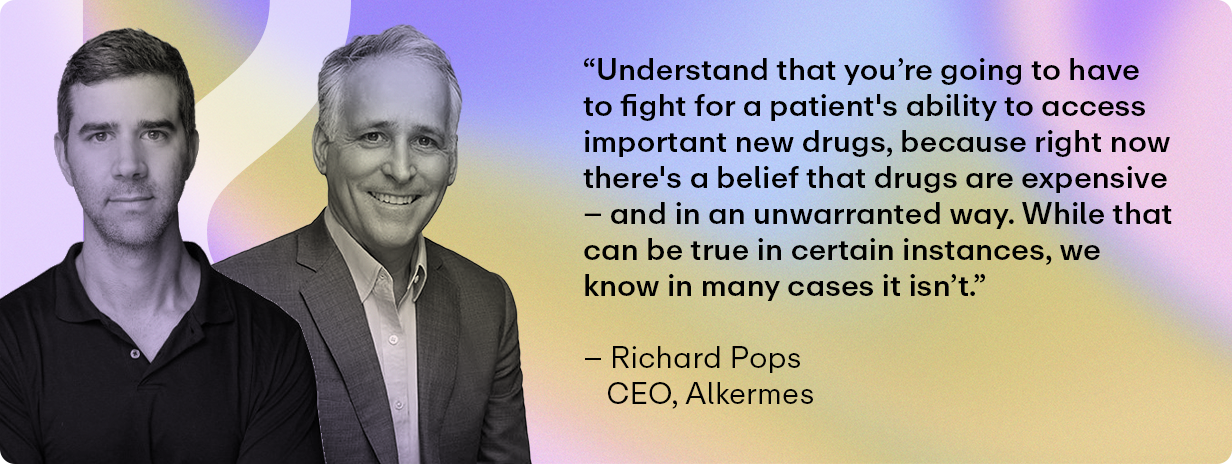Since joining Alkermes as CEO in 1991, Richard Pops has steered the organization from a 25-person upstart to a 2,000-strong innovator in the realm of neuroscience. Under his watch, the company has long prioritized medicines that make a profound difference in the day-to-day lives of patients with schizophrenia, substance-use disorders, bipolar disorder and more.
The focus on conditions that have historically been stigmatized or just plain overlooked is a big part of what makes Alkermes an outlier in the life sciences world – and what has driven its success over the last 38 years. In this excerpt from his podcast conversation with Kinara co-editor Chase Feiger, Pops looks back on Alkermes’ evolution and addresses the challenges that come with incorporating patient perspectives during the commercialization process.
(This Q&A has been edited for length and clarity. To listen to the full Kinara podcast with Richard Pops, click here.)
Chase Feiger: Alkermes evolved differently than many other organizations in the neurohealth space. Tell us about its trajectory.
Richard Pops: These therapeutic areas – we didn’t get into them intentionally. We got into them because the science took us in that direction, like when we began to understand the role that adherence would play in driving better outcomes in patients with schizophrenia.
In our early work with J&J, we thought long-acting injectable antipsychotics would be niche products. They turned out to be big products because part of the disease is the inability or the unwillingness to take your medication every day. And if you don’t take your medication, then you can’t derive the benefits.
But then we realized there were huge barriers to people actually getting these medications. Why? Because the system writ large had all kinds of barriers to make sure patients didn’t get access to medicine, because the system believes that there’s plenty of medications that work just fine. And so there’s this mismatch between what even certain caregivers, providers and treatment systems believe is acceptable standard of care and what patients report themselves in their lives.
Feiger: How does this affect your development and commercialization decision-making?
Pops: Understand that you’re going to have to fight for a patient’s ability to access important new drugs, because right now there’s a belief that drugs are expensive – and in an unwarranted way. While that can be true in certain instances, we know in many cases it isn’t. And these drugs can have a profound impact on the overall quality of patient lives. That sentiment, that energy, is really intrinsic to what we’ve built at this company.
Right now, if you launch a new drug for schizophrenia, payers will say, “You need to fail on multiple generic drugs before you can get access to a branded medication.” Implicit in that is this idea that the branded medications aren’t any better than the generics, and it analogizes to a cancerous setting where you’d say, “Well, you have to fail on multiple cancer drugs before you get access to this newer drug.” This just doesn’t make any sense, yet it persists in the serious mental illness and addiction space.
We got very interested in the idea of how to break down those barriers through medical information, through clinical trials, through policy, through all kinds of ways of making sure that the benefits of this innovation can make its way to the patient. It’s striking because many people believe that there are plenty of medications for narcolepsy. There are treatment options, but if you ask patients about their lived experience with narcolepsy type one or narcolepsy type two, there is a huge amount of unmet need.. They’re not focused on things other than just getting by every day and surviving and having enough energy to do what they need to do, rather than thriving and flourishing in their life experience.
Feiger: In our previous conversations we’ve discussed how a lot of the medicines Alkermes is developing are not just meant to modify symptoms, but to modify the disease itself. How does that pertain to patients that have narcolepsy, where there isn’t a viable product addressing symptoms like brain fog?
Pops: Narcolepsy type one is a deficiency of orexin. If you replace the missing neurotransmitter, do you drive more normal wakefulness? That’s inherently disease-modifying, because the disease is an absence of that neurotransmitter. The problem is you can’t just replace the neurotransmitter itself because it’s not a drug. It doesn’t cross a blood-brain barrier; it’s a peptide. So the challenge was: Could you make a small-molecule analog of a large molecule that also could be taken orally once a day across a blood-brain barrier? That presented a series of design challenges that made it dauntingly difficult to develop one of these.
Now, if you’re actually effectively targeting the circuitry in the brain that drives wakefulness, you demonstrate that by replacing it when it’s missing in a disease. But what does it do to the intact brain if you give super-therapeutic concentrations of these peptide analogues that drive wakefulness? Can that be effective in other disease indications? What about other conditions where patients’ lives are seriously affected by their excessive daytime sleeping? MS has serious fatigue. Alzheimer’s patients – part of the disease is that people just feel tired. What if you can address that with one of these treatments?
Feiger: Has Alkermes ever thought about other disease categories, like the rheumatologic category? A lot of those patients experience brain fog and fatigue. Or are you maintaining your focus on neurologic disorders?
Pops: Yes. But the more we get into it, the more these adjacencies start to reveal themselves.
Feiger: So what can we do together, as a scientific community, to move things forward for patients with serious mental illness and substance use disorders?
Pops: You’ve heard that old phrase – “the soft bigotry of low expectations.” It’s a thoughtful comment as it relates to people with addiction. For example, there’s not an expectation that people can resume normal lives. It’s like, “Well, let’s minimize the harm that they’re facing. Let’s give them an opioid.” And they’ll maintain a physical dependence on the opioid for the rest of their lives – and maybe for certain patients, that is lifesaving. For the expectation to be that someone with schizophrenia or someone with addiction or somebody with bipolar disease or somebody with narcolepsy can’t ultimately get to normal – having not a degraded experience, but a normal experience? That should be what we aspire to.
This also relates to the work I do with FDA on elevating the patient voice in the drug development and review process. For example, if you want to get a drug approved for schizophrenia, you use the positive and negative symptom scale. You move it X number of points and, if you separate from placebo with an alpha of less than zero-five, you can file for approval. It tells you very little about the patient’s experience taking the medication.
Let’s use assays that begin to capture what it means to take a drug – not just once, but maybe chronically. Let’s incorporate that information so patients can make a decision about how they want to treat their disease. It’s about elevating that science to capture the patient experience, so it’s not viewed as just anecdotal. It’s about elevating it to the point where it can be communicated by pharmaceutical companies and physicians, and trusted by regulators.
Feiger: How can we better incorporate that patient perspective during the commercialization of new products?
Pops: This is something that I never would’ve anticipated when we started the company. We had this naive belief that, if we built a great medicine, the world would beat a path to our door. That’s true in certain disease areas, but not in the ones that we’ve chosen to work in.
For example, in schizophrenia and bipolar disease, there’s less development happening because you realize that even if you’re successful on the drug development side, you’ve got a huge commercial challenge ahead of you – versus developing a very high-priced, orphan or rare disease or pediatric drug. You can charge hundreds of thousands of dollars for that. People will pay for it and they’ll be clamoring to get it. So it’s a very different commercial construct to be able to bring these products to market, but it’s critical that companies like ours do it.




